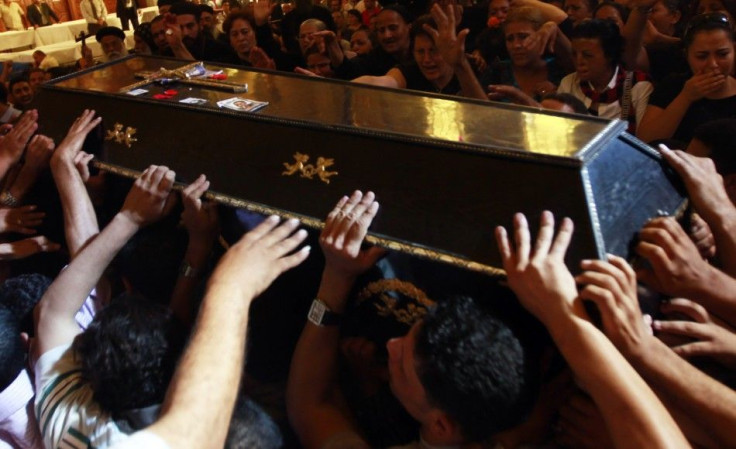Egypt Unrest: Dangerous Rhetoric, Army Undermine the Arab Spring

In Egypt, Coptic Christians mourned the 25 people killed on Sunday when a protest in Cairo turned violent.
Above the sadness, there is anger -- the intense frustration of being ignored and persecuted, of being blamed by the government for starting the violence that killed their own.
On Sunday night, Copts marching through Cairo were attacked by both plainclothes thugs and military personnel, who used armored troop carriers as battering rams. The violence outraged many in the capital, some of whom fought back, pounding military vehicles with rocks, sticks and firebombs.
Field Marshal Hussein Tantawi, the sitting head of Egypt, said that the government would investigate the incident. But Egypt's state television has already reported that the unrest was started by armed Christians, who attacked the army and civilians. So far, according to state media, the military is blameless and the Copts are the perpetrators.
[State TV] announcers reported that Christian protesters had attacked the army only because they were under emotional stress, Minister of Information Osama Heikal stated.
There was also no mention of the recent church burning and wave of vandalism that first sparked the protest.
The type of language used by Egypt's ruling party is shockingly familiar to that used by the totalitarian regimes in countries like Syria and Libya. The goal of the Egyptian uprising was to rid the country of the oppression of President Hosni Mubarak's regime, but the events during and preceding the protest Sunday indicate that the new government, led by a military council, isn't too different from the old one.
The ongoing Arab Spring has also been about fighting an oppression in the region that has only become more apparent in recent months. In Syria, President Bashir al-Assad's security forces have reportedly been shooting unarmed protestors. At last count, about 3,000 people have been killed during demonstrations in that past eight months.
Assad has continually blamed the killings on anarchic gangs, foreign thugs and gunmen with sophisticated weapons and communications. Yet, reports from activists in Syria say that the army has used live-fire on protestors and even sent in helicopters to disperse crowds.
Similarly, throughout the Libyan civil war Moammar Gadhafi has insisted that the anti-government rebellion was started by Osama bin Laden and al-Qaida, who gave Libyans psychedelic drugs and convinced them to fight.
They give them pills at night, they put hallucinatory pills in their drinks, their milk, their coffee, their Nescafe, Gaddafi said in February.
He later called it a conspiracy by Western nations like the United States to sieze Libya's rich oil-fields.
Mubarak also liked to play the blame game. Days before stepping down as President, Mubarak said that the Muslim Brotherhood, rather than state secuirty or pro-government strongmen with knives and clubs, were responsible for the violence during the Tahrir Square protests.
He also allegedly said that some of the protestors were agents from Israel and the United States attempting to sabotage the demonstrations.
During the Tahrir uprising, the army protected the Egyptian people. They arrested the violent pro-Mubarak thugs and guarded the protestors from onslaughts of government forces.
Popular chants during the January and February protests were the army and the people are one and The army and the people are one hand.
But now, the army has been slow to give power back to the Egyptian people, and has reportedly been wielding a heavy-handed influence on Egypt.
The Coptic protest was the most visible example, but the army has allegedly been abusing activists for months. In a July edition of This American Life, a protestor and blogger named Ali Sobhi detailed how he was detained and brutally beaten by the army in Tahrir Square weeks after the revolution.
The army was there, and they were arresting people, the report said. And along with the army, there were also men in ordinary clothes with sticks, beating protesters. In the old Egypt, it would have been immediately clear what was going on. The men with sticks were thugs, working with the authorities. [Sobhi] wasn't used to seeing thugs with the army. The army that had sided with the people, and refused to attack them during the revolution. He was used to seeing thugs with the police. This was new and disturbing.
The army filmed Sobhi and his friends, claiming they were conspirators. The army made the boys pose with weapons and guns so that they looked like criminals.
This type of manipulation will undermine the whatever progress Egypt makes in the post-Mubarak era.
The United Nations is also concerned with the Egyptian government's statements concerning the events on Sunday.
We urge the authorities to ensure the impartiality and independence of any investigation undertaken into the incident, Rupert Colville, spokesman for the UN High Commissioner for Human Rights, stated.
Along with anger in Egypt, there is also fear. In a state where the government could not just be ignoring, but targeting, a certain class of citizens, some people might be ready to leave for good.
I think we can expect to see a major exodus of Coptic Christians from Egypt, the Hudson Institute's Nina Shea told the National Catholic Register. This is a watershed moment. The whole reason they were in the streets was to protest lawless forces. It extinguishes all hope for them. They are utterly vulnerable.
© Copyright IBTimes 2025. All rights reserved.





















